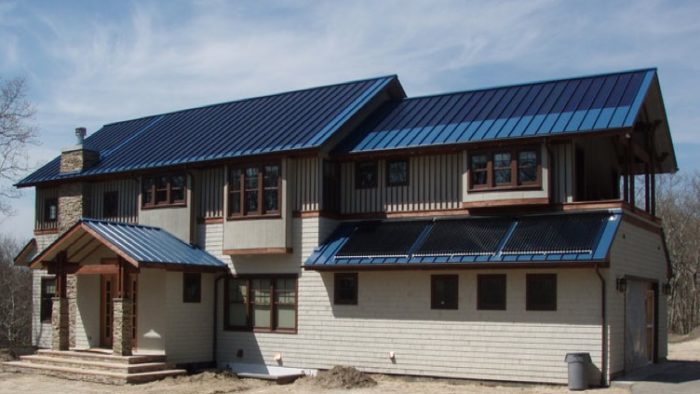
Image Credit: Hamptons Green Alliance
It’s no surprise that many people who have the financial resources to build big houses are nowadays building them with environmentally friendly materials and systems that will reduce their reliance on the grid. Some are energy efficient, some are loaded with renewable-energy systems, and many incorporate both.
In recent weeks we’ve mentioned a few such houses that, as it turns out, all weigh in at around 5,000 sq. ft.: a six-bedroom in Southern California (4,900 sq. ft.), with a LEED for Homes Platinum rating, and the first- and third-place winners (based on their Home Energy Rating index scores) of the 2010 edition of the Connecticut Zero Energy Challenge (4,539 sq. ft., and 4,944 sq. ft., respectively). Also, in late 2009, we posted a brief about a 5,329-sq.-ft. home in Avon, Connecticut, that was designed to operate at near net zero energy with a lot of help from a 15 kW wind turbine.
On prime Long Island turf
Another entry in the big-with-green-ambitions category is a project called the HGA House, a 4,980-sq.-ft. lodge-like home in Southampton, New York. HGA stands for Hamptons Green Alliance, a nonprofit forged by the project team that designed and built the house, which replaced a home destroyed by fire in December 2008. The group’s mission, Hamptons Green Alliance says on its Web site, is to promote the design, construction, materials-selection, and performance standards that, in December, landed the home a LEED Platinum rating and a HERS index of 25.
“Though the Hamptons are probably best known as the summer playground for the rich and famous,” the group says, “a home devastated by a tragic fire is being transformed into what will be a sustainable home that will set a building standard for others to follow.”
The exterior walls of the four-bedroom, six-bath house are insulated with open-cell foam and fitted with windows (from Green Mountain Windows) with U-factors ranging from 0.26 to 0.29. The roof’s 2×12 rafters are insulated with closed-cell foam. The house is equipped with a ground-source heat pump for space heating and cooling, a solar hot water system, and a 10-kW photovoltaic (PV) array (including 6 kW supplied by thin-film PV material applied to the structure’s metal roof).
The building’s LEED for Homes score, as mentioned in a post by The Energy Collective, was 104 points, well above the 90 it needed for a Platinum rating.
Weekly Newsletter
Get building science and energy efficiency advice, plus special offers, in your inbox.














6 Comments
Where's the photo stylist?
You'd think they would move the trash can and rake out the piles of dirt before taking the PR photo...
Trash can and rake...
David,
I actually prefer realistic photos to staged PR shots. I don't mind photos that include the occasional trash can, step ladder, or worker in a Budweiser T-shirt.
Recycled trash can?
Maybe they got points for it
Less is More
Really? This point system needs some serious tweaking with a stronger emphasis on energy. Someone commented on a different article on GBA about morphing LEED into LEEP where the "P" stands for performance. That was a pretty neat idea.
This home does rank decently high - but still, a 5,000-ft2 home still requires a lot of resources, whether recycled/recyclable/sustainably harvested or not.
More on my blog:
Less is More: http://energyefficiencyandretrofits.blogspot.com/2010/11/less-is-more.html
Home Labels: http://energyefficiencyandretrofits.blogspot.com/2011/01/home-labels.html
Energy Use
What's the energy use per person? And will the house be occupied year round? At 455 square meters, this house is six times larger than the average British home. Also, I'm skeptical about how a house can truly be zero carbon if it is burning wood. It's a good start for the Hamptons, but I wouldn't call it "a model of net zero energy carbon neutral green building" as the linked article does.
4 bedrooms?
I toured another house like this in Montauk. I don't like big, but I have no problem with it. I grew up one of seven kids. But two build out 5,000 sf for 4 bedrooms. LEED Platinum or not, that's the kind of thinking that has brought about our environmental woes in the first place. I grew up in the Hamptons and it broke my heart to see all that beautiful land so carelessly destroyed by summer mansions.
Log in or create an account to post a comment.
Sign up Log in